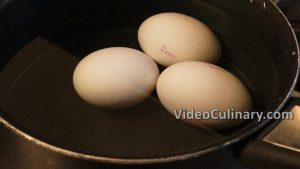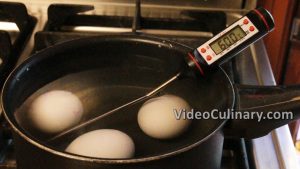Eggs are pasteurized to prevent food-borne illness such as salmonella. Heating whole eggs eliminates bacteria, and allows you to make homemade mayonnaise and other recipes, worry free.
Eggs are pasteurized to prevent food-borne illness such as salmonella. Heating whole eggs eliminates bacteria, and allows you to make homemade mayonnaise and other recipes, worry free.
 Remove the eggs from the fridge 30 minutes before pasteurizing, as It is best to pasteurize eggs at room temperature. Fill a saucepan with cold water. Place three eggs, or as many as needed. If necessary, add enough water to cover the eggs by 2 – 3 cm.
Remove the eggs from the fridge 30 minutes before pasteurizing, as It is best to pasteurize eggs at room temperature. Fill a saucepan with cold water. Place three eggs, or as many as needed. If necessary, add enough water to cover the eggs by 2 – 3 cm.
 Place over medium heat and bring to 60°C. The water should not exceed 61°C. If the temperature starts to climb up, add a little bit of cold water to the saucepan. Cook at 60°C for about three minutes. If the eggs you are using are very large, keep them in the hot water for 4-5 minutes.
Place over medium heat and bring to 60°C. The water should not exceed 61°C. If the temperature starts to climb up, add a little bit of cold water to the saucepan. Cook at 60°C for about three minutes. If the eggs you are using are very large, keep them in the hot water for 4-5 minutes.
 Drain the hot water and cool the eggs under running cold water or ice. Dry with a towel. It is best to use pasteurized eggs right away, but they can be stored for about a week in the fridge. Use to make mousse, mayonnaise, or thousand island sauce.
Drain the hot water and cool the eggs under running cold water or ice. Dry with a towel. It is best to use pasteurized eggs right away, but they can be stored for about a week in the fridge. Use to make mousse, mayonnaise, or thousand island sauce.